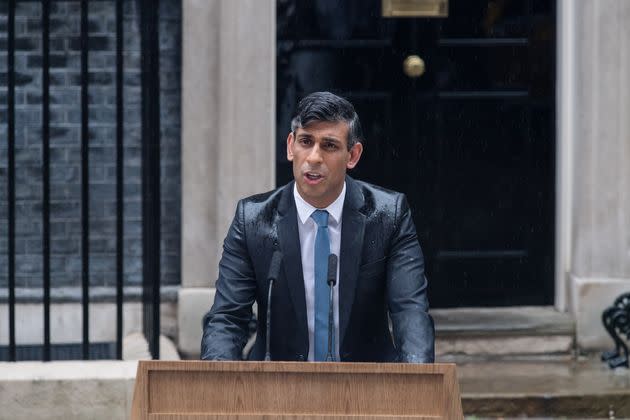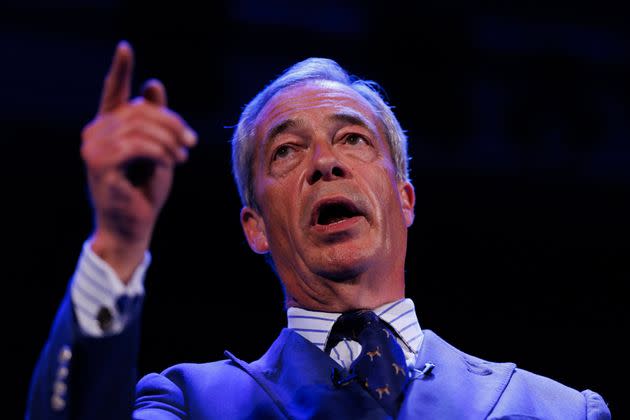Why U.K. Conservatives Are Headed For A Historic Defeat

Conservatives in the U.K. are projected to get wiped out in next month’s general election. The party of Prime Minister Rishi Sunak, which has led the country for more than a decade, is faced with a historic defeat, as voters have grown frustrated by the state of public services and by political scandals that have plagued the Tories in recent years, among other things.
While the center-left Labour Party is on track to win a huge majority, everyone seems to be focused on the Conservatives.
“We’re so used to thinking about elections in terms of who’s going to win, but this one, it’s much more about actually the state of the loss and who is going to be in opposition,” Louise Thompson, a senior lecturer in politics at The University of Manchester, told HuffPost.
Bad news has been piling up for Sunak. On July 4, he could become the first sitting prime minister to ever lose their seat in a general election, while his party may not even win enough seats to become the official opposition, according to a recent poll conducted by market research company Savanta for The Daily Telegraph, which forecasts the centrist Liberal Democrats winning just three fewer seats than the Tories.
The findings illustrate “the risk of electoral extinction that the Conservative Party is now having to contemplate,” Savanta’s political research director wrote in an op-ed.
🚨NEW Savanta MRP for @Telegraph
📈Lab projected for 382 majority
📉Cons fighting with LDs to be Official Opposition
Seat forecast
🌹Lab 516 (+316)
🌳Con 53 (-319)
🔶LD 50 (+42)
🎗️SNP 8 (-40)
🌼PC 4 (+2)
⬜️Other 0 (-1)
17,812 UK adults, changes to last GE notional results pic.twitter.com/JNfSE82XQr— Savanta UK (@Savanta_UK) June 19, 2024
Meanwhile, a YouGov poll released last week showed Reform UK — the populist right party of Nigel Farage, who’s an ally of former President Donald Trump — overtaking the Conservatives for the first time, spreading even more alarm in Tory circles.
“No other poll reported the same finding, though every poll has reported a fall in Conservative support and nearly all a narrowing of the Conservative lead over Reform,” polling expert John Curtice noted on the BBC.
“Standing at just 20%, Conservative support is now at its lowest ever in British polling history,” Curtice added.
The current projections indicate a stunning reversal of the electoral map following the 2019 general election, in which the Conservatives won nearly 44% of the vote under Boris Johnson and Labour came in second with just over 32%. At the time, the Brexit Party — Reform’s predecessor, which didn’t run candidates in constituencies held by the conservatives — came in sixth and didn’t win any seats.
Robert Johns, a professor of politics at the University of Southampton, told HuffPost it’s not surprising that the Conservatives have become unpopular after 14 years in power, noting that in theory their party should have faced similar struggles in 2019.

However, the framing of that year’s race as the “Brexit election” — in which Johnson promised to deliver on the country’s vote to leave the European Union, effectively making the Tories both the insurgents as well as the mainstream conservative option compared with Labour — gave the party a brief respite.
“It was like normal politics suddenly became suspended,” Johns said. “The Conservatives became temporarily the ‘leave’ party, and that was enough to see them through.”
This time around, though, it seems like nothing can interrupt the Conservatives’ fall from grace, with the Tories now appearing focused on limiting the scope of a defeat rather than hoping for a win.
Sunak’s flaws, highlighted further by his poorly run campaign, have done little to change the trajectory of the race.
“Clawing back to what was still a catastrophic defeat in 1997 for the Conservatives [when they lost to Labour by 12.5 percentage points] would now likely be seen as a good result,” Luke Tryl, the U.K. director of research group More in Common, told Times Radio.
‘The Chickens Have Come Home To Roost’
Tim Bale, a professor of politics at Queen Mary University of London, traced the projected demise of the Tories back to 2010 when a Conservative-led government imposed austerity measures on the country, leaving public services weakened to this day.
“Although it seems like a long time ago, what’s essentially happened is that the chickens have come home to roost,” Bale said.
“The fundamentals really matter. The fact that public services are falling apart is crucial,” Bale continued.
That, coupled with the inability to deliver on Brexit promises around reducing immigration numbers, has contributed to the frustration of voters.
Conservatives’ rhetoric on immigration has had the simultaneous effect of inflaming right-wing voters, many of whom have pivoted to Farage’s party, and alienating the moderate liberal voters who are now backing Labour or the Liberal Democrats.
In recent years, the Conservatives have also been through back-to-back changes in leadership, which led voters to question their competence to govern.
Amid the resignation of Theresa May, Johnson won the Tory leadership race in the mid-2019 ahead of the general election in December, when he secured a landslide victory. Yet in 2022 he was forced to step down as the prime minister and leader of Conservatives, following allegations of misconduct against a top ally and growing public anger about violations of COVID-19 restrictions by his government.
Liz Truss, who won the next Tory leadership race amid Johnson’s departure, went on to become the country’s shortest-serving prime minister, after her botched economic plan spooked the markets and caused the value of the pound to tumble, undermining Britain’s reputation for economic competence and leaving her no option but to resign.
Enter Sunak, who after nearly two years in office has struggled to turn things around.

While things were always going to be difficult for Sunak, his lack of political skill and the perception that he’s out of touch — mixed with a series of campaign blunders, including his decision to depart early from D-Day commemorations in France and travel home for an ITV interview — have worsened his position.
“It would have taken a miracle to win this election for a Conservative prime minister, but he’s turned a bad situation into what looks like it could be a disaster,” Bale told HuffPost.
The Farage Effect
Farage, a provocateur and one of the main architects of Brexit, had intended to stay out of U.K. general election and instead focus on the U.S. presidential race to help get Trump back in the White House. But he abandoned this plan after catching wind of the dire state of the Conservatives.
In early June, Farage announced that he would run as a candidate in the Clacton constituency and become the leader of Reform UK.
“The Conservatives were already on the way out, and he has ensured that the defeat will probably turn into a landslide of what looks at the moment like epic proportions,” Bale said.
And Conservatives’ current messaging that a Labour majority is all but certain could backfire, making right-wing voters perceive their choice as “low risk” and pick Reform UK over Sunak’s party, warned Polly Mackenzie, who served as the director of policy for then-Deputy Prime Minister Nick Clegg from 2010 to 2015.
“That sense that there’s no jeopardy anymore may encourage people away from the Conservative Party,” Mackenzie said on the “How To Win an Election” podcast.
If Farage manages to snag the Clacton seat and get into Parliament, he could end up being invited to join the Conservative Party as part of a potential merger between the Tories and Reform UK, despite the fact that many moderate conservatives would detest the prospect, Bale said.

This could potentially lead to Farage becoming Conservative Party leader sometime before a 2029 general election, which would be a stunning turn of events, especially since Farage has so far failed to get elected to the House of Commons seven times. (Farage served in the European Parliament from 1999 until 2020, when the U.K. officially left the European Union.)
While Farage has appeared evasive when asked about whether he would join the Conservatives, he said he “absolutely” would vie to be prime minister in 2029.
Despite the momentum that Reform UK is experiencing, the country’s first-past-the-post system means it would win just a handful of seats, at best. Still, a scenario in which the Reform UK leader and a few others in his party get elected to British Parliament would be a “Farage honeymoon,” as this would give him outsize influence over the future of the Tories, a senior Conservative source told the BBC’s Chris Mason.
Thompson told HuffPost that if Reform manages to win even just one seat, that would give it a “foothold in the House of Commons,” but perhaps even more crucially make it eligible to receive public funding intended for opposition parties.
As Thompson explained, that would help it recruit staffers and get a more prominent role in Parliament, as opposed to just being a party on the fringes.
What About Labour?
Bale said that although Farage has garnered a lot of attention in the campaign, his presence shouldn’t distract from the main message that voters are expected to send in this year’s election, which is that they are fed up with the Conservatives.
“If Labour makes a decent fist of being in government, then, you know, whatever happens to Nigel Farage and the Conservative Party probably isn’t going to make very much difference even in 2029,” Bale said.
But More in Common’s research shows that while voters across the country are indeed disappointed with the Tories, this sentiment isn’t just limited to the Conservatives, pointing to a “deeper challenge,” Tryl told Times Radio.
“It’s not just the usual apathy and cynicism, but something a bit deeper — this sense that after the past few years, people aren’t convinced that any politician of any stripe can make a difference,” Tryl said.
Meanwhile, Johns added that some people expect Labour to win a titanic majority in July but worry that the legitimacy of the result could be questioned by antiestablishment figures like Farage, since the left and the right could get a similar amount of electoral support when adding up the vote tally of Conservatives and Reform UK, but the right would get disproportionately fewer seats due to the country’s electoral system.
“If he starts questioning an election’s legitimacy in a slightly Trump-like fashion, things might get messier than they ever have before,” Johns told HuffPost.

